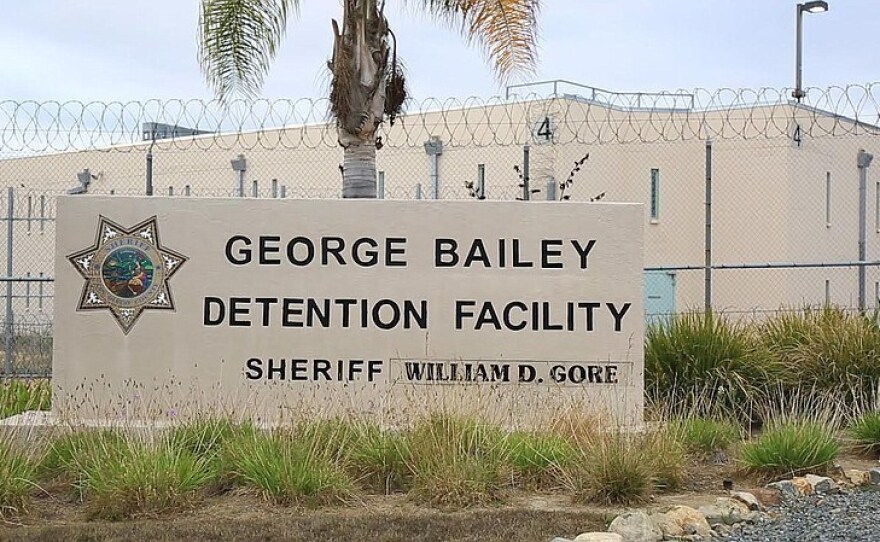Speaker 1: (00:00)
A package of proposed changes to the access and authority of the San Diego county law enforcement review board is moving forward. That changes were approved by the board. Last week, the reforms include allowing the board to expand oversight to the medical workers and county jails, and to allow a qualified board representative to attend death scene investigations, supporters of the changes say they will help the review board accomplish its mission of investigating in custody deaths and accusations of misconduct. Joining me is the executive officer of the county law enforcement review board or clerk, Paul Parker, and Paul. Welcome.
Speaker 2: (00:40)
Thank you very much for this opportunity. Now
Speaker 1: (00:42)
You submitted this package of proposals to the board and they've been called the biggest changes proposed to clubs since its beginnings 30 years ago. Why did you take this step?
Speaker 2: (00:53)
Maureen? I looked at the current state of law enforcement and community relations, not just in San Diego, but in the country. When we were created 30 years ago, the whole purpose was to have a transparent and independent oversight entity looking at the actions of sworn members of the Sheriff's department and probation department. Over the years that transparency has been reduced, almost eliminated, actually eliminated by some case law changes and statutory changes. And therefore our independence also comes into question when we can not be as transparent as we were formed to be.
Speaker 1: (01:33)
Can you tell us the way in custody, death investigations are now conducted by clerk and what constraints that you're under
Speaker 2: (01:41)
Right now when an in custody death occurs, the Sheriff's department or probation department notifies us rather quickly, they give us the general circumstances as far as the name of the person who died and where they died. And then at that point, we wait several months for their completed investigation. It could be upwards of a year in some cases or more. Once we then received the documentation that far after the death, we simply review what they have presented to us and opine that way as to whether or not any policies were violated, whether any laws were violated, whether there was anything that we could recommend that they do differently.
Speaker 1: (02:20)
You have no independent investigation going on, no routine access to autopsies and no oversight over the medical staff.
Speaker 2: (02:29)
We currently do not do any independent analysis of the death investigations because we're simply waiting for the materials from the respective departments. And most of the time that's the Sheriff's department. The whole purpose of making this specific request is to be independent, to do an independent analysis, to be present, to obtain this information, and then also review the information that's provided to us at a later time in reference to the medical staff. We have no jurisdiction over those that provide medical care or mental health care to the inmates and custody. So we believe we're not getting the big picture of the deaths that are occurring in custody without the ability to look at the care provided by medical staff and opine whether or not standard of care was appropriate.
Speaker 1: (03:14)
In your opinion, under the existing rules, has cleared been able to fulfill its mission of oversight over county law enforcement?
Speaker 2: (03:21)
I would say no. I would say we, because we lack the transparency and because we lack that independent nature, or we're simply waiting to review documentation, we certainly haven't lived up to the spirit of why we were created in 1990.
Speaker 1: (03:40)
The proposed changes to clerk require new legislation
Speaker 2: (03:44)
To increase the transparency of clerk and civilian oversight in the state of California. We believe the only way to do that is through new legislation. We are hamstrung from court decisions that happened in 2003, 2006 and 2008. And thus far, I don't believe that anyone's moved forward with attempting to increase the transparency of civilian oversight, which is exactly what we're trying to do.
Speaker 1: (04:07)
And you give us an idea of what those court decisions, how they hampered your investigation.
Speaker 2: (04:14)
Prior to 2003, our club meetings where we discussed the cases were held in public or investigative reports were public documents and released to the public. We also were able to identify deputies by name in public. In 2003, our meetings became closed. We couldn't discuss anything about a case in public. Our investigative reports subsequently, and a couple of years later, we're also restricted. We simply now can only release a highly redacted version of the rationale that we use to come up with our findings on each allegation. And no one knows no member of the public, no complainant, no family members of those who have died, know the exact content of the conversations that clerk members have, or the exact content of the thoroughness of many of the investigations that are not desperately needed. No one knows because it's behind closed doors.
Speaker 1: (05:12)
Now your proposed reform has passed their first hurdle by getting approval from the clerk board. What other approvals do they need?
Speaker 2: (05:19)
Depends on which ones we're talking about. Go increase the transparency. I must work with county staff at the office of strategic and intergovernmental affairs to identify legislation or to begin to draft legislation that the board of supervisors would be put before the board of supervisors to support moving forward, having jurisdiction over the medical and mental health folks, I'll be working with county staff basically to draft a letter to the board of supervisors, requesting a change to our, to our administrative code, the charter, our rules and regulations to allow for us to have that jurisdiction. And then at that point, we will also meet with the labor unions of the folks that are, that would be impacted as far as the response to death scenes and sealing of medical examiner reports on the behalf of the Sheriff's department, those are policy recommendations, and we simply afforded those to the, to the sheriff department and are waiting for a response as to whether or not the Sheriff's department is going to allow for us to go to death scenes and whether the Sheriff's farming's going to allow for them to not routinely seal information from the public on certain in custody deaths.
Speaker 1: (06:26)
Now, before joining clerk, you worked not only as a police officer for several years, but you also led clerk a few years ago before returning last year. Police officers in general have not always been terribly supportive of law enforcement review board. So what made you decide to return to Clara then what made you decide to propose these changes?
Speaker 2: (06:50)
The return to clerk was a fairly easy decision because there had been some changes at the county level. There have been some national dialogues that had started, obviously after the George Floyd incident, after the George Ford murder, it was an opportunity to increase the conversation, to improve the conversation between law enforcement and the community here in San Diego county. So that's why I came back, looking at it from, from that perspective and to make these proposals, in my opinion, will dramatically increase the transparency and hopefully will contribute to the public's trust in what is going on at the law enforcement level. That's why we're here to be transparent, to be independent, and to facilitate that communication between law enforcement and the community to hopefully assist in improving whatever practices may need to be improved and ultimately attempting to assist law enforcement with preventing deaths in the future.
Speaker 1: (07:46)
I've been speaking with the executive officer of the county law enforcement review board, Paul Parker, and Paul, thank you so much.
Speaker 2: (07:53)
And thank you again for the opportunity.








